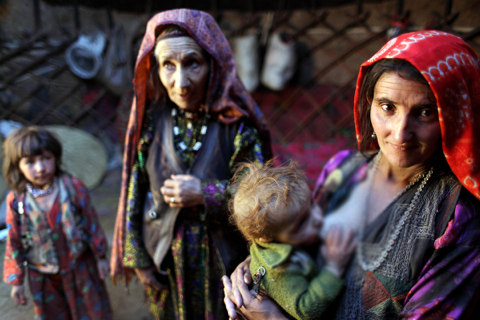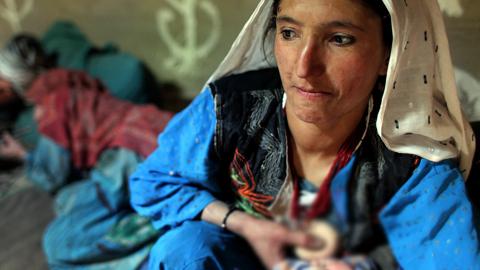KABUL - World Breastfeeding Week (WBW) is being highlighted in Afghanistan with a call for greater awareness on this sensitive but urgent health issue, with the theme of this year’s observance being ‘Breastfeeding Support: Close to Mothers,’ which aims to reinforce the role of peer counseling.
“There is urgent need for creating awareness regarding the importance of breastfeeding among the people,” said Afghanistan’s Minister of Public Health, Dr. Suraiya Dalil, at an event in the capital, Kabul, on the topic, on Sunday.
Breastfeeding in Afghanistan is a sensitive topic because of long-standing taboos against publicly discussing topics related to female anatomy. Yet it is an urgent message because if more Afghans were aware of the benefits of breastfeeding, health workers believe, then the health and life spans of Afghan children would improve.
Afghanistan has the world’s highest infant mortality rate. According to the Ministry of Public Health, for each 1,000 babies born in Afghanistan, some 130 will die before they reach the age of one.
The UN World Health Organization (WHO) states that breastfeeding is the best source of nourishment for infants and young children and one of the most effective ways to ensure child health and survival. People who were breastfed as babies are less likely to be overweight or obese later in life. They may also be less prone to diabetes and perform better in intelligence tests; but globally only an estimated 38 per cent of infants are exclusively breastfed for six months.
For this year’s WBW, which runs from 1 to 7 August, WHO and its partners are calling for more support for breastfeeding mothers. The UN agency notes, amongst other things, that health facilities that support breastfeeding – by making trained breastfeeding counsellors available to new mothers – encourage higher rates of the practice.
According to studies by the United Nations, about half of Afghan children are not breastfed. Health experts in Afghanistan also say that the role of peer counseling has often been overlooked.
Peer counseling is important because although mothers begin well, breastfeeding rates decline sharply over time. Although no firm figures exist, health experts say that the proportion of Afghan infants and young children exclusively breastfed after three months drops sharply.
These concerns were part of the message delivered at the Kabul gathering on Sunday, hosted by Dr. Dalil. Also in attendance were representatives from the WHO and the UN Children’s Education Fund (UNICEF). The Minister cited research showing that breastfeeding infants in the first few hours after birth reduces their morality rate by 22 per cent. On the other hand, delaying feeding for just one hour after birth can increase a child’s chance of dying by 30 per cent in the first weeks after birth. According to health practitioners, a child ought to be breastfed for at least six months after its birth.
With assistance from the United Nations, the Ministry of Health recently created a National Strategy on infant nutrition. The Strategy combines new rules and regulations to improve nutrition levels among infants through breastfeeding with a national awareness-raising campaign that aims to tackle the taboo of breastfeeding. Another component of the campaign will be to remind working mothers that under Afghan law they are entitled to 13 weeks of paid maternity leave.
Along with outlining the benefits of breastfeeding at the gathering, the Public Health Minister spoke about the rise in use of sub-standard milk powder. Expressing concern for the health of Afghan children, she called on Afghanistan’s private sector to stop importing substandard milk powder, which the Minister said was not a healthy alternative to breastfeeding. She also asked the media to stop airing commercials about milk powder.
The WHO notes that infant milk formula does not contain the antibodies found in breast milk. Additionally there are risks arising from the use of unsafe water and unsterilized equipment or the potential presence of bacteria or other contaminants in powdered formula. Malnutrition can result from over-diluting formula to "stretch" supplies. While frequent feeding maintains breast milk supply, if formula is used but becomes unavailable, a return to breastfeeding may not be an option due to diminished breast milk production.
In his remarks to the event, the WHO Representative in Afghanistan, Arshad Quddus, called breastfeeding a biological function that deepened the bond between mother and child.
He noted that breastfeeding greatly reduced the household expenses of poor families, and stressed that breastfeeding was an important public health issue that needs to be reinforced repeatedly. He also discussed the importance of peer and community support systems, including from families, friends and employers to sustain breastfeeding.
“Breastfeeding contributes in achieving each of the Millennium Development Goals (MDGs) and has a large impact on the future well-being of our society,” said Mr. Quddus, referring to the eight goals, agreed on by world leaders at a UN summit in 2000, which set specific targets on global issues such as poverty alleviation and child and maternal health.






